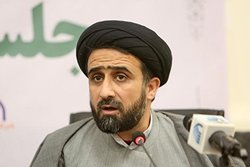 Hujjat al-Islam Hashemian said, “The phenomenon of ‘fire at will’ arises when we encounter inefficiencies and management deadlocks in the formal structures of the country’s cultural management.”
Hujjat al-Islam Hashemian said, “The phenomenon of ‘fire at will’ arises when we encounter inefficiencies and management deadlocks in the formal structures of the country’s cultural management.” RNA – In an exclusive interview with Rasa News Agency, Hujjat al-Islam Dr. Sayyed Mohammad-Hoseyn Hashemian, a professor and lecturer at Baqir al-Ulum University in Qom, referred to the metaphor of “fire at will,” and said, “‘Fire at will’ has Quranic roots at its disposal. God Almighty says in the holy verse, ‘Say, ‘I give you just a single advice, that you rise up for God’s sake, in pairs or singly’ [34:46].”
He added, “This command of God Almighty in the Holy Quran implies that the believer must not, under any circumstances, stand idly by in the face of social, cultural and political structures and systems and become passive, even if these structures are tyrannical and against monotheism and the word of God, the monotheist is obliged to confront according to this verse.”
Emphasizing on standing up and countering the enemies’ attacks, Hujjat al-Islam Hashemian stated, “The metaphor of ‘fire at will’ has exactly the same meaning, and the young revolutionary and religious believer cannot remain silent in the face of the onslaught of global arrogance against the Islamic Revolution and the pure Muhammadan Islam that he pursues through social, cultural, political and economic structures.”
His Eminence continued, “In the field of social studies, duality is portrayed as the duality of factor or structure. Some believe that social structures are superior to the human factor, while others argue that social structures play no role and define all roles under the human factor.”
Explaining the obvious pattern of fire in the society, he clarified, “In my opinion, Martyr Qasem Soleymani is a very perfect model for all the cultural forces of the Islamic Revolution because he incorporated all the features and characteristics of firepower at his disposal. One of the most important characteristics that every fire force needs at his disposal is sincerity and piety in practice.”
In conclusion, Hujjat al-Islam Hashemian explained the concept of ‘fire at will,’ “The phenomenon of ‘fire at will’ arises when we encounter inefficiencies and management deadlocks in the formal structures of the country’s cultural management. Therefore, managers must not be expected to interfere, and we must ask managers not to have anything to do with these issues, not to hinder the creation and exit from many things, and in many areas, young people must be trusted and overcome this structural and organizational point of view.”
Rasa News Agency
112/976